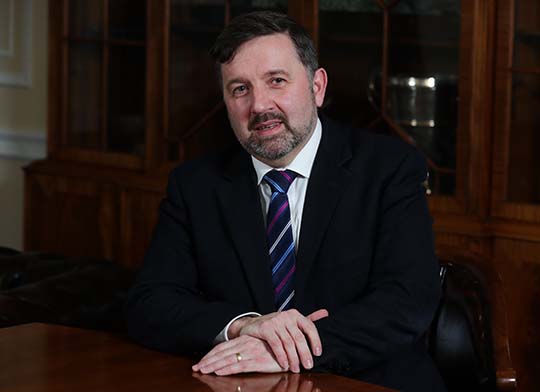McGrath says waiting lists show a health service is in crisis.

concerned at the long health waiting times.
SDLP Health Spokesperson Colin McGrath MLA has said that further escalating waiting times across the North is yet another symptom of a health service in crisis, struggling to cope with a global pandemic.
Mr McGrath was responding to the quarterly waiting times statistics, which show that 327,189 patients were waiting for a first outpatient appointment and almost 100,000 people are waiting to be admitted to hospital for treatment.
The South Down MLA said: “It is nothing short of an outrage than hundreds of thousands of patients are waiting weeks and weeks for hospital appointments, with an absolute failure to meet the ministerial targets around waiting times.
“These statistics are damning but behind the statistics are real people; patients and their families waiting in pain and anxiety. We must do better for them.”
“This is yet another reminder, if it were ever needed, of how the pandemic has exacerbated a crisis within our health service. It is absolutely vital that people remain vigilant, follow the public health advice, to prevent our health service getting completely overwhelmed in coming days and weeks.”
“I want to pay tribute to the amazing health and social care staff across the North, going above and beyond in intolerably difficult circumstances.”
Health Minister Robin Swann comments on waiting time statistics
Hospital waiting lists must be a major NI Executive priority in 2021, Health Minister Robin Swann has stressed.
Commenting on the latest waiting time statistics, the Minister said: “I very much regret that the number of people enduring excessive waits for assessment or treatment has increased again. Unfortunately this position can be expected to worsen further.”
The Minister said that, given the surge in Covid-19 cases, it was unavoidable that elective care activity would reduce due to the need to redeploy staff to Covid related activity.
The Health Minister also paid tribute to the ongoing efforts of staff.
“Battling the pandemic as well as maintaining non-Covid services as much as possible has been a balancing act and I am grateful to HSC staff for their resilience and efforts.

“In any other walk of life, it would have been natural to wind things down after the first surge as we moved into summer. Health service staff did not do that, but instead redoubled their efforts.
“During the first wave, our HSC system delivered 12,150 new outpatient consultations in April. There were 29,163 in October. In terms of inpatient or day-case procedures, 4,859 were delivered in April, compared with 13,301 in October.
“Similarly, there were 39,907 outpatient reviews in April compared with 56,071 in October. Overall, there was over 73% more activity in October than April. Our surge and rebuild plans were effective in keeping services going.
“Each Trust surpassed its target for the period July to September 2020 but the pandemic has undoubtedly exacerbated what was already a crisis with waiting times.”
In addition to in-house activity, Trusts have been utilising local independent sector capacity. During the period 29 June to 18 October 2020, approximately 320 independent sector theatre sessions have been utilised by Trusts, meaning that 1,010 patients have had their procedure undertaken in the independent sector – paid for by the health service.
The Minister emphasised that tackling waiting lists must be a major priority for the entire Executive in 2021.
“Waiting list were a clear priority in New Decade New Approach but plans were blown off course by the pandemic.
“I am very conscious that public spending is likely to be very constrained next year and that all Departments will be facing serious funding pressures.
“The reality is that tackling waiting lists will not be possible without sustained and substantial investment and additional staffing.”
























